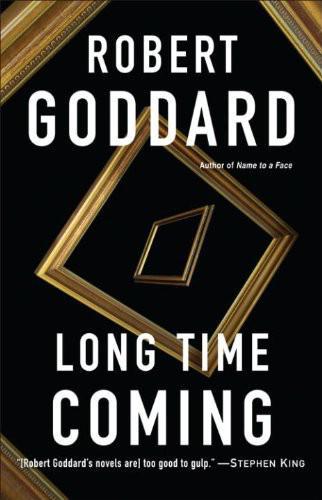
Long Time Coming
A Novel
کتاب های مرتبط
- اطلاعات
- نقد و بررسی
- دیدگاه کاربران
نقد و بررسی

Starred review from January 11, 2010
In this irresistible thriller full of deceit, duplicity, and vengeance, British author Goddard (Name to a Face
) shifts effortlessly between 1976, when 68-year-old Eldritch Swan, thought killed in the Blitz, resurfaces from 36 years in an Irish prison, and 1940, when Eldritch, a cocksure secretary for an unscrupulous Antwerp diamond merchant, Isaac Meridor, prepares to leave for America. The older Eldritch, who appears as weird as his given name implies, assures his nephew, Stephen, he’d been framed in Dublin for unspecified “offenses against the state,” though he admits to helping steal Meridor’s Picasso collection. Eldritch needs Stephen’s help to prove the collection rightfully belongs to Meridor’s wife, daughter, and granddaughter, Rachel Banner. Bit by tantalizing bit the convoluted tale of Eldritch’s unknowing involvement in high wartime crimes and misdemeanors during Britain’s “finest hour” emerges, deftly counterpointed by Stephen’s growing attachment to Rachel.

January 1, 2010
Goddard's latest period suspenser (Sight Unseen, 2007, etc.) combines World War II, the Irish Troubles and a disreputable uncle.
Returning to England after resigning from both his position with an oil company and his American fiance, Stephen Swan learns that he won't be the only newcomer to his mother's guest house in Paignton. Eldritch Swan, just released from an Irish prison after serving 36 years, has asked to stay with his late brother's family, whom he's never met, until he can get his feet beneath him. Uncle and nephew fail to bond. Apart from assuring Stephen that his prison term wasn't for a violent crime and hinting that he was an innocent who was framed, Eldritch refuses to reveal why he's been jailed since 1940; if he ever told a soul, he adds, he'd be sent back. His plan for getting on his feet doesn't exactly inspire confidence. Approached by a lawyer whose shadowy client is willing to pay£50,000 for proof that American tycoon Jay Brownlow's collection of Picassos was stolen from Antwerp diamond merchant Isaac Meridor as he fled the approaching Nazis, Eldritch indicates that he's the perfect man for the job—because he helped steal them. Goddard tacks back and forth between 1976 and 1940, dexterously raising new and deeper questions, then unfolding just enough of Eldritch's colorful history to answer them, or at least to encourage both his nephew and Meridor's granddaughter Rachel Banner to ever-greater complicity in his schemes. The suspect Eldritch fingers is unctuous, untouchable Miles Linley, now Sir Miles, for whom Eldritch fagged at school and for whom he ran an increasingly dodgy series of subdiplomatic errands as Hitler threatened Ireland and Churchill waited anxiously to see whether Eamon de Valera would support England, remain neutral or work for a German victory.
More scattershot and less inevitable-seeming than Goddard's best work, but also sharper-edged than usual. Eldritch's checkered career marks a welcome change from the author's customary, sometimes oppressive, suavity.
(COPYRIGHT (2010) KIRKUS REVIEWS/NIELSEN BUSINESS MEDIA, INC. ALL RIGHTS RESERVED.)

January 1, 2010
An ill-gotten family fortune culled from Congolese diamond mines, a forged Picasso, and a hellish Irish prison form the nexus of this eccentric thriller. There are two narrators: the first, speaking of events in 1976, is Stephen Swan, a geologist who has long worked in the booming Texas oil fields. On his return to England, he finds that an uncle, who he was told had lost his life during the Blitz, is alive but not well, having been just released from an extended stay in an Irish prison under suspicion of spying. The second narrator is the uncle himself, who tells his nephew about criminal plots hatched during the war that have taken on strength and danger through the decades. Goddard shuttles between 1976, when the forged Picasso and other stolen works are on public display and must be recovered for the wronged owners, and 1940, when the whole conspiracy began. Although the plot is complex, Goddards gift for suspense never flags.(Reprinted with permission of Booklist, copyright 2010, American Library Association.)

























دیدگاه کاربران